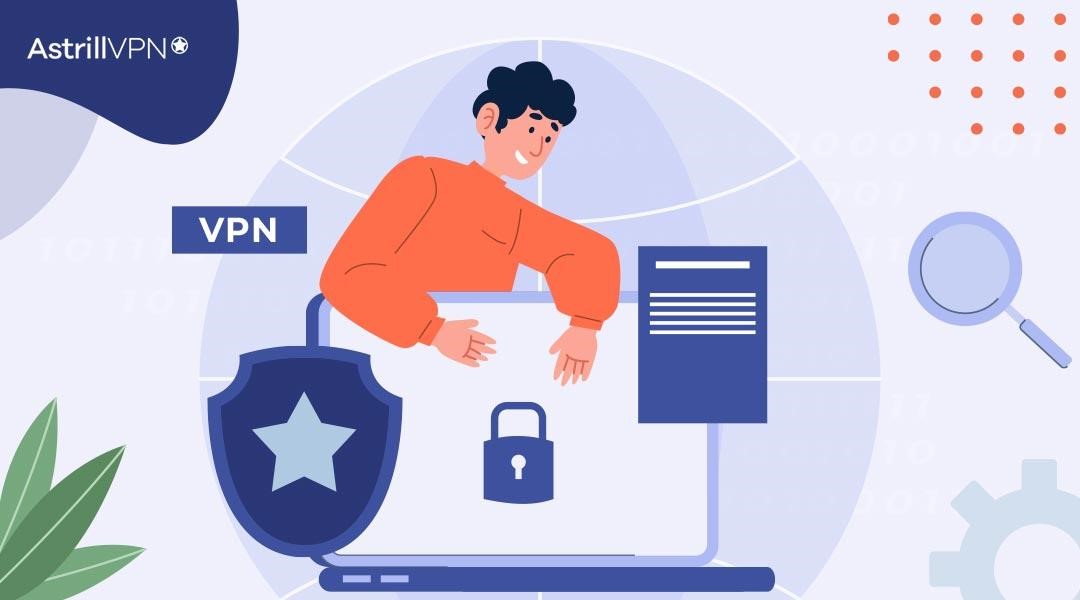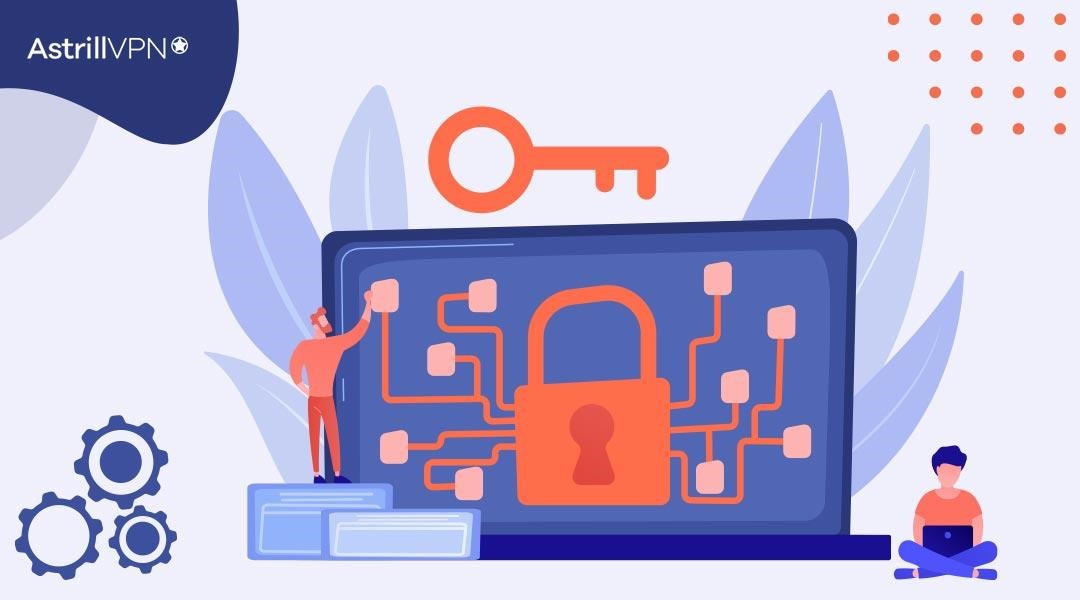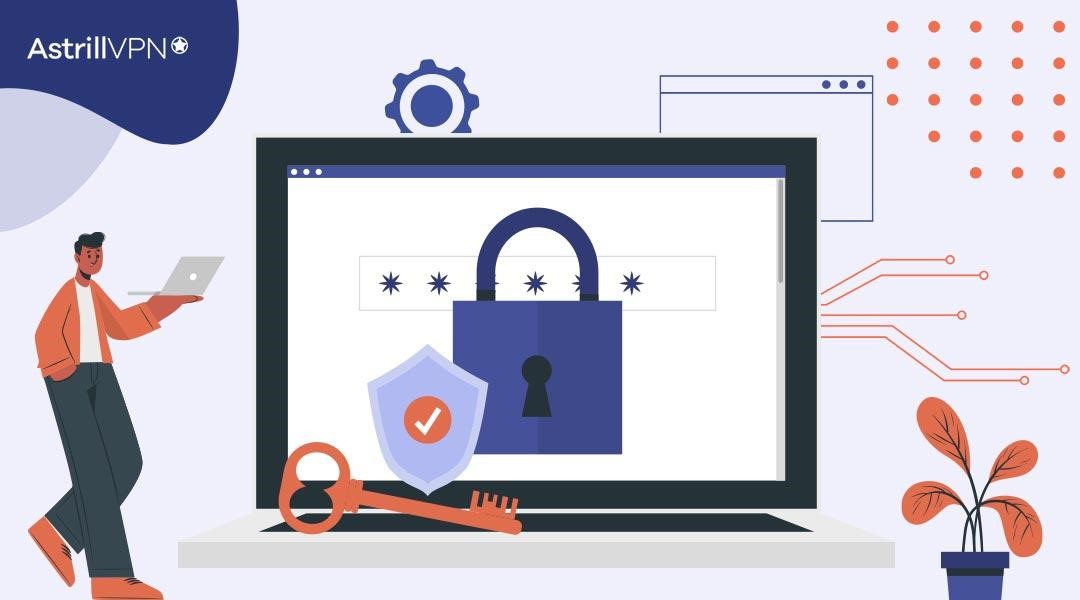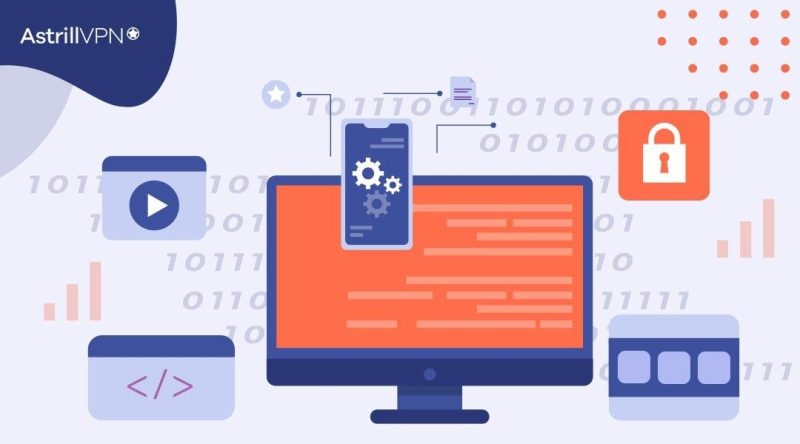Encryption serves as a powerful tool to safeguard sensitive information from unauthorized access and maintain confidentiality. In this guide, we have explained VPN encryption in detail and discussed the types of protocols you may come across.
So without further ado, let’s dive right into VPN encryption and understand what it is and what it is used for:
Table of Contents
What is encryption, and What is it used for?
Encryption is converting plain text or data into a coded form that can only be accessed by authorized individuals who possess the decryption key. It ensures that sensitive information remains secure and private, even if intercepted by unauthorized parties.
Encryption is used extensively in various domains, including communication networks, financial transactions, and data storage, to safeguard valuable data from unauthorized access or tampering.
Why is encryption Important?
Encryption plays a critical role in maintaining the confidentiality and integrity of information in the digital world. Here are some key reasons why encryption is important:
- Encryption provides a robust layer of defense against unauthorized access to sensitive data. Even if attackers gain access to encrypted information, they can only decipher it with the decryption key.
- Encryption helps protect individual privacy by preventing unauthorized surveillance or monitoring of communications. It ensures that personal conversations, emails, and other digital interactions remain confidential.
- Many industries and jurisdictions have specific data protection and privacy regulations in place. Encryption helps organizations meet these compliance requirements by safeguarding sensitive information.
- Encryption helps protect valuable intellectual property, trade secrets, and proprietary information from theft or unauthorized use. This is especially crucial for businesses that rely on innovation and competitive advantages.
How does VPN encryption work?

Does VPN encrypt data? Yes, it does; that’s the way it conceals users’ details. Now the question is how this VPN encryption works?
VPN encryption works by employing various encryption algorithms and secure tunneling techniques to protect your online activities. When you connect to a fast VPN, your device establishes a secure connection with the VPN server.
This connection setup involves negotiating encryption parameters and agreeing on the encryption algorithms to be used. Once the VPN connection is established, your data is encrypted before transmission. Encryption algorithms, such as AES (Advanced Encryption Standard), transform your original data (plaintext) into an unreadable format (ciphertext). These algorithms utilize encryption keys, which can be either symmetric or asymmetric.
In symmetric encryption, the same key is used for both encryption and decryption, and it is securely shared between your device and the VPN server during the connection setup. Asymmetric encryption uses a pair of mathematically related keys: public and private keys. The public key is freely shared, while the private key remains securely stored on your device.
To ensure the confidentiality and integrity of your data, VPNs employ a technique called tunneling. Your VPN encrypted data is encapsulated within an additional layer of security, forming a secure tunnel between your device and the VPN server. This VPN tunnel encryption prevents unauthorized parties from intercepting or tampering with your data as it travels across the internet.
The encrypted data is transmitted through this secure tunnel to the VPN server. Upon arrival, the VPN server decrypts the data using the appropriate decryption keys.
Finally, the decrypted data is forwarded to its intended destination, ensuring secure and private communication. Through encryption and secure tunneling, VPNs provide a robust layer of protection for your online activities, ensuring that your data remains confidential and secure.
Types of encryption
There are two main VPN encryption types:
1. Symmetric key encryption

Symmetric key encryption, also known as secret key encryption, is a form of encryption where the same key is used for both the encryption and decryption processes. This means that the sender and receiver must share the same secret key beforehand.
The encryption process takes the original plaintext and transforms it into ciphertext using the secret key. The receiver, in possession of the same key, can then decrypt the ciphertext and retrieve the original plaintext.
The main advantage of symmetric key encryption is its efficiency and speed. Symmetric encryption algorithms are designed to process large amounts of data quickly. Some popular symmetric encryption algorithms include Advanced Encryption Standard (AES), Data Encryption Standard (DES), and Triple DES (3DES). These algorithms use complex mathematical operations to scramble the plaintext and make it unreadable without the key.
However, a significant challenge in symmetric key encryption is securely sharing the secret key between the sender and receiver. If an unauthorized party gains access to the key, it can decrypt the ciphertext and access the sensitive information. To address this issue, key distribution mechanisms such as key exchange protocols or pre-shared keys are used to securely transmit the secret key.
2. Asymmetric encryption

Asymmetric encryption, also known as public key encryption, is a type of encryption that uses a pair of mathematically related keys: a public key and a private key. These keys are generated simultaneously, and while the public key is freely shared with others, the private key is kept secret and known only to the owner.
The encryption process with asymmetric encryption involves using the recipient’s public key to encrypt the plaintext and generate the ciphertext. Once encrypted, only the recipient possessing the corresponding private key can decrypt the ciphertext and retrieve the original plaintext. This ensures that only the intended recipient can access the decrypted message.
Asymmetric encryption provides several advantages over symmetric encryption, primarily in terms of key distribution and authentication. Since the public key can be freely shared, it eliminates the need for a secure key exchange mechanism.
Additionally, asymmetric encryption enables digital signatures and authentication, as the sender can encrypt a message with their private key, allowing the receiver to verify the integrity and authenticity of the message using the sender’s public key.
Commonly used asymmetric encryption algorithms include RSA (Rivest-Shamir-Adleman) and Elliptic Curve Cryptography (ECC). These algorithms are computationally intensive, making them slower compared to symmetric encryption algorithms. Therefore, asymmetric encryption is typically used for exchanging symmetric keys securely rather than encrypting large amounts of data directly.
Benefits of Using a VPN
● Privacy Protection
A VPN offers enhanced privacy protection by encrypting your internet traffic and masking your IP address. It prevents your ISP, government agencies, or malicious actors from monitoring your online activities, safeguarding your privacy.
● Security Enhancement
Using a VPN adds an extra layer of security to your online connections. VPN encryption ensures that any data transmitted between your device and the VPN server is protected from interception or tampering by unauthorized parties. This is particularly vital when using public Wi-Fi networks, where the risk of data interception is higher.
● Access to Restricted Content
A VPN allows you to bypass geographical restrictions and access content that may be blocked or censored in your location. By connecting to an AstrillVPN server in a different country, you can appear as if you are browsing from that location, enabling access to region-specific content or services.
Are all VPNs encrypted?
While VPNs are designed to encrypt your internet traffic and protect your data, the specific encryption protocols and algorithms used can vary between different VPN service providers. It’s important to choose a reputable VPN service that employs strong encryption to ensure the security and privacy of your online activities.
It’s worth noting that not all VPNs prioritize encryption equally. Some free or less reputable VPN services may use weaker encryption methods or even compromise on encryption to prioritize other factors such as speed or cost-effectiveness. Therefore, it is essential to conduct thorough research and choose a VPN provider that places a high emphasis on encryption and security.
VPN Encryption Protocols: Pros & Cons
| VPN Encryption Protocols | Pros | Cons |
| OpenVPN | OpenVPN is known as one of the best VPN encryption protocols, for its robust encryption and security measures. It uses OpenSSL library and supports various encryption algorithms like AES, Blowfish, and more. | Due to its robust encryption and the overhead of encapsulating data in additional layers, OpenVPN can sometimes be slower compared to other protocols. |
| IPsec | IPsec provides strong encryption and authentication mechanisms, ensuring secure communication. It supports multiple encryption algorithms and authentication methods. | Setting up IPsec VPNs can be more complex compared to other protocols. It requires proper configuration of policies, keys, and parameters. |
| WireGuard | WireGuard is designed to be simple, efficient, and performant. It utilizes state-of-the-art cryptography, making it lightweight and faster than many other protocols. | WireGuard is a relatively new protocol, and while it has gained popularity, it is still being audited and further developed |
| SSTP | SSTP leverages the widely adopted SSL/TLS protocol, providing strong encryption for VPN traffic. It uses port 443, making it less likely to be blocked by firewalls or network restrictions. | SSTP is primarily supported on Windows devices. While it may work with third-party clients on other platforms, it may not be as widely available as other protocols. |
| StealthVPN | StealthVPN is specifically designed to bypass deep packet inspection (DPI) and VPN blocking techniques. It disguises VPN traffic as regular HTTPS traffic, making it difficult for network administrators or ISPs to detect and block the VPN. | Due to the obfuscation techniques used, StealthVPN may introduce a slight performance overhead compared to other protocols. |
Relationship between VPN protocols and Encryption?
VPN protocols and encryption are closely intertwined. Encryption is securing data by converting it into an unreadable format, while VPN protocols define the rules and procedures for establishing and maintaining a VPN connection.
VPN protocols encompass various aspects, including authentication, key exchange, and data encapsulation. These protocols work hand-in-hand with encryption algorithms to ensure secure and private communication between your device and the VPN server.
Different VPN protocols may offer varying levels of encryption and security. Choosing a VPN service that implements robust encryption and employs well-regarded protocols to safeguard your data is crucial.
How to check if your VPN is encrypted
To verify if your encrypted VPN connection is established properly, you can perform the following checks:
- When visiting websites, ensure the URL starts with “https” instead of “http.” The “https” indicates a secure, encrypted connection.
- Perform DNS and IP leak tests to ensure your VPN is not leaking sensitive information. There are online tools available that can help you verify if your VPN is properly protecting your DNS queries and IP address.
- Review the documentation provided by your VPN provider. Look for information on the encryption protocols and algorithms they use and their commitment to privacy and data protection.
- Advanced users can employ network monitoring tools to inspect the traffic between their devices and the VPN server. You can verify if the traffic is encrypted by analyzing the packets exchanged.
Can I choose the level of encryption used by my VPN?
The level of encryption used by a VPN is typically determined by the VPN service provider. Users generally do not have the option to directly choose the encryption level. Reputable VPN providers select secure encryption protocols and algorithms to ensure the highest level of protection for their users.
Can I choose the level of encryption used by my VPN?
The level of encryption used by a VPN is typically determined by the VPN service provider. Users generally do not have the option to directly choose the encryption level. Reputable VPN providers select secure encryption protocols and algorithms to ensure the highest level of protection for their users.
Conclusion
VPN encryption is the cornerstone of online privacy and security. Through the utilization of symmetric and asymmetric encryption algorithms, VPNs create a secure encryption tunnel for our internet traffic, shielding it from prying eyes.
By understanding the various VPN encryption protocols and their pros and cons, we can make informed decisions when choosing a VPN service. Moreover, ensuring that our VPN is properly encrypted through simple checks empowers us to take control of our digital security.
Commonly used encryption protocols in VPNs include OpenVPN, IPsec (Internet Protocol Security), WireGuard, and SSTP (Secure Socket Tunneling Protocol).
AES (Advanced Encryption Standard) is a widely adopted symmetric encryption algorithm used in VPNs. It is known for its strong security and is commonly used to encrypt data in transit.
While no encryption is completely impervious, reputable VPN services use strong encryption methods that are highly resistant to being broken.
The use of encryption in a VPN can introduce some overhead and may potentially result in a slight decrease in internet speed.



No comments were posted yet